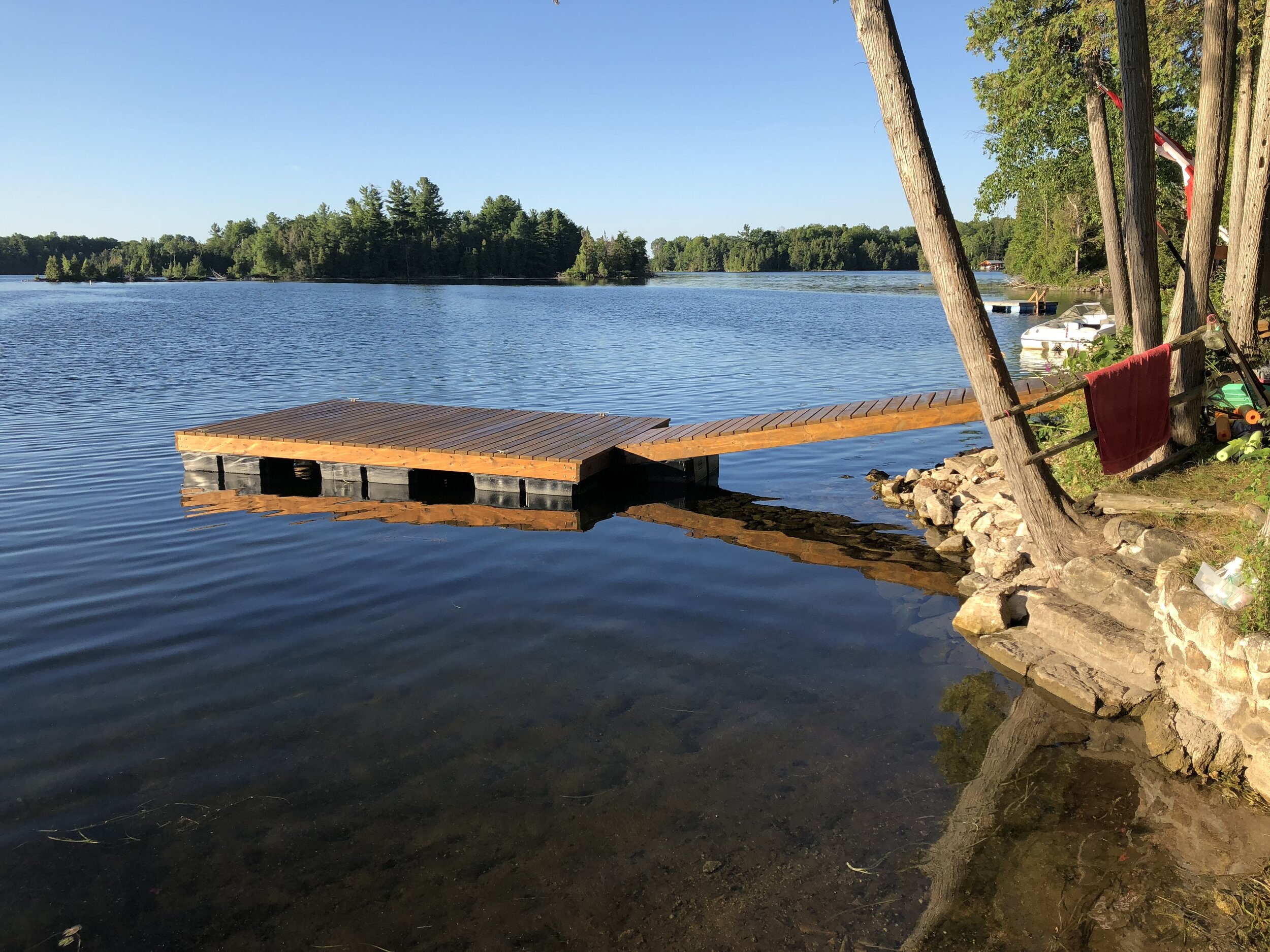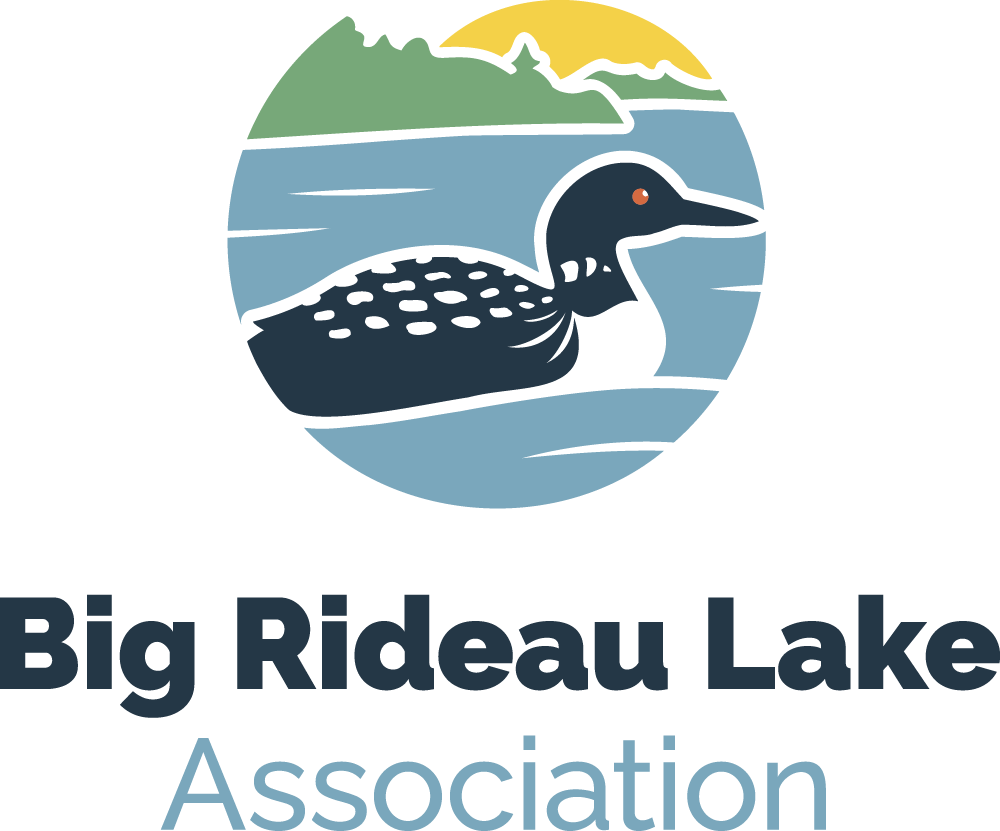
Environment
Within the BRLA, we work to monitor, maintain and protect the water quality, shores and environs of Big and Lower Rideau Lakes, and study, report and, if necessary, advocate on environmental issues that affect our area.
We are also active in the protection of wildlife habitat. Tracking and promoting the health of the Rideau Lakes is one of our key concerns. Our lake’s environment supports a great diversity of wildlife, in its deep cold water and along its rocky shorelines and in its wetlands.
Water Quality | Natural Edge | Loon Monitoring | Conservation Plan
Rideau Lakes Environmental Fund: | Bass Research | Trout Research
Water Quality Monitoring
Water Rangers is a non-profit, Ottawa-based organization that provides test kits to groups and individuals to record observations of their lakes, streams and rivers and report suspected issues. There are many people who care about water quality but do not have access to tools to collect and interpret the data about their own lake, river or stream.
Your BRLA membership fee helps fund monthly testing of water quality throughout the Big Rideau starting in May and ending in September by BRLA Water Rangers. Starting in 2025, we are fielding an expanded team of ten “citizen scientists” who have volunteered to gather data from testing sites strategically located in all sectors of the lake. We will be conducting testing in the Lower Rideau for the first time. A big thank you to our Rangers who help generate consistent baseline testing data across our diverse lake.
Bass Population Research – On August 8th, 2023, the BRLA hosted a webinar with Dr. Phillip of the Fisheries Conservation Foundation to hear about Bass Population & Pre-Season Fishing. You can view the recording of the webinar by using this link and the passcode 40f!FX9u
Big Rideau Lake Trout Telemetry
Lake trout are native to Big Rideau Lake, but their numbers have dropped over the years because of too much fishing and changes to their habitat. This project — supported by the Rideau Lakes Environmental Foundation, the Big Rideau Lake Association, Watersheds Canada, and the Fisheries Conservation Foundation — aims to better understand how lake trout use the lake and where they spend their time.
In 2025, scientific researchers David Philipp and Steven Cooke will work with local anglers to catch adult lake trout. Each fish will have a small tracking device surgically implanted so we can follow their movements for two years.
The team will collect and analyze all the tracking and temperature related data to find out how lake trout move during different seasons, and whether males and females behave differently. They will also keep an eye on fishing activity around the lake to see if trout are spending time in areas with lots of anglers. This will help the researchers identify important habitats, like spawning grounds, and figure out where the fish might need more protection.
The Rideau Lakes Environmental Foundation (RLEF) is a small not-for-profit organization associated with the Big Rideau Lake Association and Upper Rideau Lake Association.
Rideau Lakes Environmental Foundation is a registered charity and partner organization to the BRLA making any contributions eligible for a tax receipt. When you donate to the RLEF it can only be used for the stated purposes.
The data we gather on the Big Rideau each year is shared with the Water Rangers organization, the Rideau Valley Conservation Authority and Data Stream which conducts testing in the Great Lakes Basin, is broader in scope and includes data collected by researchers, governments, and other community-based monitoring groups using a variety of collection methods. We also share data with Lake Partners, an initiative associated with FOCA, a province-wide, volunteer-based, water-quality monitoring program – the largest of its kind in Canada!
By bringing this data together in one place, it can be used to answer questions from the local to regional scale. These varied databases are accessed by the scientific community as they track water quality across the wider region.
Overall, our 2024 data indicates that over a five-year period we are staying within established limits for all our tests which include measures for Alkalinity & pH, water and air temperature, hardness, dissolved oxygen, water clarity and depth.
For more information on Water Rangers visit: https://waterrangers.com/?v=e20fce6bd526
Learn more about one of the Greatest Rangers of All Time, Doris Albert [link to Doris content]
To volunteer as a Water Ranger, please email environment@bigrideaulakeassociation.com
Natural Edge Program
Shoreline habitat is an important contributor to environmental health by supporting terrestrial and aquatic wildlife and reduction of pollution through the control of runoff. Natural Edge is a program developed by Watersheds Canada to protect freshwater by restoring a natural shoreline. Big Rideau Lake Association is one of many partners from across Canada working with Watersheds Canada to implement this program.
Once again, the BRLA is encouraging members to participate in this shoreline habitat restoration program by:
Applying to have part of your property benefit from plants that will preserve the natural habitat. The program is focused on building natural areas with local plants (NOT a garden) and normally covers 2-3 metres along a shoreline with 40 local plants of varying sizes. A planner trained by Watersheds Canada will visit your property to create a plan to fit your needs. Cottage owners will be responsible for purchasing their plants from Watersheds Canada and the BRLA will cover the planting costs of 5 volunteer property owners in 2025. Beyond the first 5 implementations, cottage owners will be responsible for their own planting based on the plan provided by Watersheds Canada.
Volunteering to assist with the planning shoreline rehabilitation (training provided by Watersheds Canada) and-or planting.
Here is what some of your neighbors say about their experience with the program:
“I decided to use Natural Edge because securing the shoreline with native plants is an all-around good idea and it was a goal set by my parents some years ago.”
“With the frequent torrential rainfalls we have been experiencing, we noticed an increase in erosion on our property, and we were looking for solutions. We were very impressed with the site assessment completed by Watersheds Canada and the recommendations from the team.”
“I had my property visited by Watersheds Canada related to this project. They planted more than 50 plants of various species. They were very knowledgeable, worked easily around schedules, and were very punctual.”
“We have a rock wall along part of our shoreline and over the years have noticed erosion behind the rocks resulting in depressions along our shoreline. We believe that Natural Edge will eliminate that erosion and provide a natural environment friendly to birds and other fauna.”
For more information on the Natural Edge Program visit: https://naturaledge.watersheds.ca/
And, be sure to Download a free copy of the RVCA guide to sustainable drainage https://www.rvca.ca/component/edocman/sustainable-drainage-the-property-owners-guide-to-reducing-runoff/viewdocument/678?Itemid=0
If you would like to make a meaningful contribution to the sustainability of the habitat in your area, please contact: environment@bigrideaulakeassociation.com.
Loon Monitoring
For many members, seeing loons or hearing their calls are signs of nature closely associated with time at the cottage. In 2025, a group of over 10 BRLA members is volunteering to join the Canadian Lakes Loon Survey, a program administered by Birds Canada. The purpose of the program is to track the reproductive success of loon pairs each summer. By monitoring the health of the loon population, we can determine whether action is needed to preserve loon habitat on the lake.
To see the Canadian Lakes Loon Survey: https://www.birdscanada.org/bird-science/canadian-lakes-loon-survey
If you would like to join our team of volunteers, please contact: environment@bigrideaulakeassociation.com
BRLA Conservation Plan
Given the importance of environmental objectives to the BRLA, in 2025 the Board approved work to begin on a Conservation Plan. Once completed, the Plan will guide future environmental programming. The first step in developing the Plan is to contact cottagers around the lake, understand and prioritize their concerns related to conservation. We will then proceed with the collection of existing environmental data, analyzing and synthesizing what it means for the lake and its surrounding area in relation to the priorities identified by cottagers. This work includes consultations with the Townships surrounding the lake, Parks Canada and the Rideau Valley Conservation Area. Members will be given an opportunity to review and comment on this “State of the Lake Report” before the Conservation Plan is produced.
Bass Population Research
RLEF has supported researchers at Carleton University, Queens’ University, and other organizations. In 2022, RLEF provided a grant to the Fisheries Conservation Foundation, a group that does research in both freshwater and saltwater areas. The grant was a contribution to the last year of a multi- year study. Their recent report to RLEF on the status of the bass population in local lakes included input from both Queen’s University and Carleton University. For more on the details of the study see attached summary HERE or listen to the webinar hosted by the Big Rideau Lake Association.
The findings from this research has identified that the bass population in Big Rideau now includes fewer bass and smaller bass. Further research has shown that hook wounds in male bass guarding their nests have increased dramatically while the survival rate of bass beyond one year has plummeted equally dramatically. If we take 1990 as the baseline and start tracking 1+ year old bass as 100% in that year, in 2024, there were 8% in Lake Opinicon - a drop of 92%! In that same period, hook wounds in Lake Opinicon increased from 30% of the bass surveyed in 1990 to almost 100% of the bass surveyed in 2024. This points directly to catch and release fishing for bass prior to the opening of bass season in late June.
The current bass fishing season regulations only allow fishing for bass starting on the third weekend in June. While the intent of that regulation is noble, the reality is that it is toothless to prevent catch and release fishing that endangers the bass population. Conservation Officers cannot charge anyone with preseason fishing if the fisherman points out that they are not fishing for bass, but for sunfish, pike, etc. All early season fishermen know that nuance and the amount of catch and release fishing prior to bass season opening has increased dramatically. Unfortunately, when a male bass is removed from protecting his nest for as little as 5 minutes, other fish may eat all the eggs and the nest is lost.
Rideau Lakes Environmental Fund (RLEF) has provided significant funding to the Fisheries Conservation Foundation (FCF) to expand their Bass Spawning Sanctuaries (BaSS) from the 2024 scientific experiment in Charleston & Opinicon Lakes to Big and Upper Rideau Lakes. Thirteen other lakes in Eastern Ontario have also agreed to join the program. FCF is working with the Ontario Ministry of Natural Resources (MNR) to expand the program in 2026 for the incremental lakes. At a very high level, ALL fishing is prohibited in a BaSS until 2 weeks after Bass Season opens. That provides the male bass with additional time to protect their nests and prevents preseason fishing. Once the BaSS opens, all fishing is permitted. Stay tuned for further information as the discussions with MNR proceed. The goal is to have BaSS in place for 10-20% of the shoreline in Big and Upper Rideau Lakes in 2026.
Protecting the environment has long been a key focus of the BRLA. While from years past, the following links demonstrate some of the previous work and engagement on issues impacting the environment on and around the Rideau Lake, much of which is still relevant today.
Environment Archive
Algae and Aquatic Plan Growth on the Big Rideau Lake
Link to details on Dr Smol and the Webinar
Cormorants
https://www.bigrideaulakeassociation.com/cormorants
Invasive Species
https://www.bigrideaulakeassociation.com/invasive-species
Well Water Safety
https://www.bigrideaulakeassociation.com/well-water-safety
How the Lake Works – Right now there is a link on the Environment page and on the footer of the webpage.
https://www.bigrideaulakeassociation.com/how-the-lake-works-1










